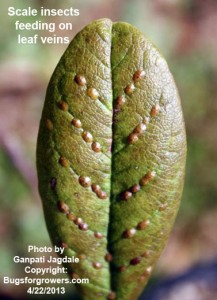Control scale insects with Armored Scale Parasitoid Aphytis melinus– Bugsforgrowers.com
1. Description of Aphytis melinus wasp
Beneficial scale insect parasitic wasp, Aphytis melinus is also recognized as the golden Chalcid because of its yellowish gold color. Although these mini wasps are only 1.2 mm long, they are very effective in controlling different species of following armored scale insects (Fig.1). These beneficial wasps are commercially available and can be easily released in the scale insect infested citrus groves, greenhouses and gardens.

2. Aphytis melinus wasps are effective against following five scale insects
- California red scale, Aonidiella aurantii (Host crops: Citrus and flowering plants)
- California yellow scale Aonidiella citrine (Host crops: Citrus)
- The magnolia white scale, Pseudaulacaspis cockerelli (Host crops: 100 plant species including mango)
- The oystershell scale, Lepidosaphes ulmi (Host crops: Willows)
- The San Jose scale, Quadraspidiotus perniciosus (Host crops: nut and stone fruit trees)
3. Factors affecting effectiveness of Aphytis melinus wasp
- Aphytis melinus wasps use their antennae to find their scale insect hosts.
- Both adults and larvae of Aphytis melinus kill and feed on scale insects.
- Aphytis melinus wasps have a good reproductive potential so that they can be easily establish in the citrus grove, greenhouses or gardens when there is plenty of food available for them.
- Because of recycling capacity of Aphytis melinus wasps, money and time would be saved as you do not need to reapply them frequently after first application.
- If Aphytis melinus wasps are successfully recycled in the garden, they can protect plants from armored scale insects throughout or beyond the cropping season.
- It is important to control ants before releasing wasps, as ants are known to disrupt oviposition of wasps.
- These wasps perform well when optimum temperature is between 76 and 85°F and a relative humidity between 40-50%. However, these optimum conditions are not necessarily a prerequisite for their success against scale insects.
4. How Aphytis melinus are applied
- Aphytis melinus wasps are commercially available and are shipped as pre-emerged adults.
- Aphytis melinus wasps can be easily released by opening the shipped containers in the areas infested with armored scale insects in the citrus groves, greenhouses or gardens.
5. How Aphytis melinus wasps kill their scale insect hosts
- Aphytis melinus wasps use their antennae to find and select their scale insect hosts.
- Using their antennae, Aphytis melinus wasps makes sure that the selected scale insect is healthy and not already been parasitized by other parasites.
- When suitable scale insect is found, a female wasp lays single egg underneath of each female scale insect that has loosened its position on the leaf to initiate reproduction.
- Each female of Aphytis melinus can lay up to 25 eggs.
- After hatching from an egg, the wasps’ larva starts feeding on the underside of the scale insect externally. Since the wasp larvae of Aphytis melinus wasps feeds on the scale insects externally, they are considered as ectoparasites but not as endoparasities (organisms that complete all or part of their life cycle inside the insect host’s body are called as endoparasitic insects).
- Parasitized scales insects looks like dried scales with dark blackish spots.
- Like other insects, the larvae of these wasps also develop through different instars, pupate and then emerge as new parasitoid(s) from scale cadavers and seek new scale insects.
- Like other predatory insects, these wasps are also known to feed directly on the scales and they can easily kill and feed on as many as 25 scale insects.
Publications
- Sorribas, J., van Baaren, J. and Garcia-Mari, F. 2012. Effects of climate on the introduction, distribution and biotic potential of parasitoids: Applications to biological control of California red scale. Biological Control 62: 103-112.
- Zappala, L., Campolo, O., Grande, S.B., Saraceno, F., Biondi, A., Siscaro, G. and Palmeri,V. 2012. Dispersal of Aphytis melinus (Hymenoptera: Aphelinidae) after augmentative releases in citrus orchards. European Journal of Entomology 109: 561-568.
